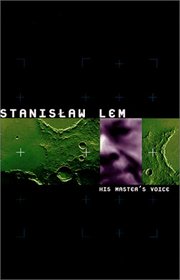Helpful Score: 1
This is a science fiction novel but it is only sort-of science fiction, and, for that matter, only sort-of a novel.
Its in the form of a memoir or musing by a noted mathematician who worked in the upper levels of a secret government project code-named His Masters Voice the purpose of which was to decode and comprehend a message, seemingly sent by intelligent beings from outer space, on neutrino waves.
We are told from the outset that the project was not successful no communication was set up, nor was the message even comprehended but at the same time it had a major impact on society, technology, and more.
So there isnt really any suspense in the book or even all that much of a plot. Its really just the fictional Dr. Hogarths thoughts on the matter. However, Hogarth is an erudite, brilliant, philosophical character. His character sketches of his colleagues are witty, vivid and, I would guess, accurate portrayals of the types one might find on such a research project. His frequently tangential thoughts cover not only the difficulty of communicating with theoretical aliens, but the nature of communication itself, the nature of humanity, the uses to which we put technology, and especially how culture affects comprehension.
So although I said it was only sort-of science fiction, the work deals more with many of the ideas that science fiction as a genre exists to explore, than much of the sci-fi that I have read. And, although it was written in 1967 (not translated into English until the 80s, I believe) it hardly felt dated at all an impressive feat.
Its in the form of a memoir or musing by a noted mathematician who worked in the upper levels of a secret government project code-named His Masters Voice the purpose of which was to decode and comprehend a message, seemingly sent by intelligent beings from outer space, on neutrino waves.
We are told from the outset that the project was not successful no communication was set up, nor was the message even comprehended but at the same time it had a major impact on society, technology, and more.
So there isnt really any suspense in the book or even all that much of a plot. Its really just the fictional Dr. Hogarths thoughts on the matter. However, Hogarth is an erudite, brilliant, philosophical character. His character sketches of his colleagues are witty, vivid and, I would guess, accurate portrayals of the types one might find on such a research project. His frequently tangential thoughts cover not only the difficulty of communicating with theoretical aliens, but the nature of communication itself, the nature of humanity, the uses to which we put technology, and especially how culture affects comprehension.
So although I said it was only sort-of science fiction, the work deals more with many of the ideas that science fiction as a genre exists to explore, than much of the sci-fi that I have read. And, although it was written in 1967 (not translated into English until the 80s, I believe) it hardly felt dated at all an impressive feat.
Like much of Lem's work, it's more of a social commentary than sci-fi. Be warned, the introduction is particularly hard to get through and not necessary for the rest of the story - you may want to skip it. This is a story of an attempt at alien contact that failed, which is bitterly told by a once-hopeful mathmetician who wanted desparately to solve the mysterious code. Remarkable book in its complex view of human nature and the politics behind scientific discovery, but a very dense read and the picture it paints of human capabilities is a bleak one.
That said, I really, really liked the book and thought it was worth every minute of the time I spent on it. Most people who write science fiction don't consider the possibility of failure, or of the limitations of the human brain and psyche. Parts of it are very funny, and heartwarming. The intense emotional and intellectual connections the mathematician makes with other scientists trying to solve the puzzle are both fascinating and moving. In the end, I walked away completely awed by the strangeness of the alien message and even the bits and pieces put together were enough to overwhelm.
That said, I really, really liked the book and thought it was worth every minute of the time I spent on it. Most people who write science fiction don't consider the possibility of failure, or of the limitations of the human brain and psyche. Parts of it are very funny, and heartwarming. The intense emotional and intellectual connections the mathematician makes with other scientists trying to solve the puzzle are both fascinating and moving. In the end, I walked away completely awed by the strangeness of the alien message and even the bits and pieces put together were enough to overwhelm.
http://miasbooklist.blogspot.com/2006/12/his-masters-voice-stanislaw-lem-rating.html




